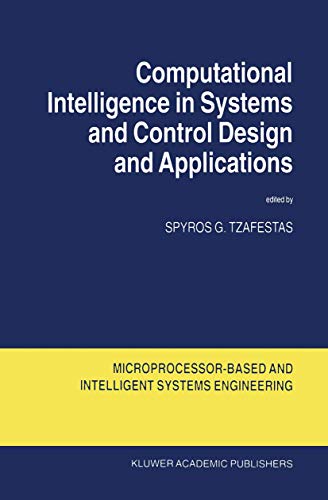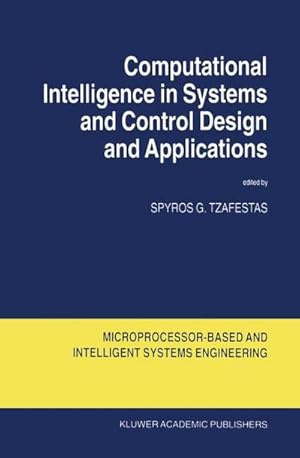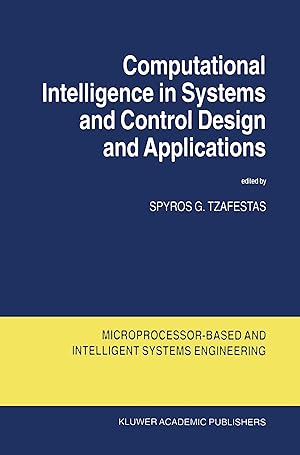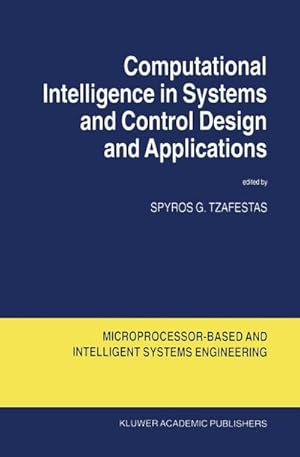computational intelligence systems control di tzafestas s g (10 risultati)
FeedbackFiltri di ricerca
Tipo di articolo
- Tutti i tipi di prodotto
- Libri (10)
- Riviste e Giornali (Nessun altro risultato corrispondente a questo perfezionamento)
- Fumetti (Nessun altro risultato corrispondente a questo perfezionamento)
- Spartiti (Nessun altro risultato corrispondente a questo perfezionamento)
- Arte, Stampe e Poster (Nessun altro risultato corrispondente a questo perfezionamento)
- Fotografie (Nessun altro risultato corrispondente a questo perfezionamento)
- Mappe (Nessun altro risultato corrispondente a questo perfezionamento)
- Manoscritti e Collezionismo cartaceo (Nessun altro risultato corrispondente a questo perfezionamento)
Condizioni Maggiori informazioni
- Nuovo (9)
- Come nuovo, Ottimo o Quasi ottimo (1)
- Molto buono o Buono (Nessun altro risultato corrispondente a questo perfezionamento)
- Discreto o Mediocre (Nessun altro risultato corrispondente a questo perfezionamento)
- Come descritto (Nessun altro risultato corrispondente a questo perfezionamento)
Legatura
- Tutte
- Rilegato (Nessun altro risultato corrispondente a questo perfezionamento)
- Brossura (10)
Ulteriori caratteristiche
- Prima ed. (Nessun altro risultato corrispondente a questo perfezionamento)
- Copia autograf. (Nessun altro risultato corrispondente a questo perfezionamento)
- Sovracoperta (Nessun altro risultato corrispondente a questo perfezionamento)
- Con foto (4)
- Non Print on Demand (6)
Lingua (1)
Prezzo
- Qualsiasi prezzo
- Inferiore a EUR 20 (Nessun altro risultato corrispondente a questo perfezionamento)
- EUR 20 a EUR 45 (Nessun altro risultato corrispondente a questo perfezionamento)
- Superiore a EUR 45
Spedizione gratuita
- Spedizione gratuita in U.S.A. (Nessun altro risultato corrispondente a questo perfezionamento)
Paese del venditore
Valutazione venditore
-
Computational Intelligence in Systems and Control Design and Applications (Intelligent Systems, Control and Automation: Science and Engineering, 22)
Da: Best Price, Torrance, CA, U.S.A.
EUR 96,32
Convertire valutaEUR 7,67 per la spedizione in U.S.A.Quantità: 1 disponibili
Aggiungi al carrelloCondizione: New. SUPER FAST SHIPPING.
-
Computational Intelligence in Systems and Control Design and Applications (Intelligent Systems, Control and Automation: Science and Engineering, 22)
Da: Lucky's Textbooks, Dallas, TX, U.S.A.
EUR 102,48
Convertire valutaEUR 3,41 per la spedizione in U.S.A.Quantità: Più di 20 disponibili
Aggiungi al carrelloCondizione: New.
-
Computational Intelligence in Systems and Control Design and Applications (Intelligent Systems, Control and Automation: Science and Engineering, 22)
Da: Ria Christie Collections, Uxbridge, Regno Unito
EUR 112,12
Convertire valutaEUR 13,85 per la spedizione da Regno Unito a U.S.A.Quantità: Più di 20 disponibili
Aggiungi al carrelloCondizione: New. In.
-
Computational Intelligence in Systems and Control Design and Applications
Editore: Springer Netherlands, Springer Netherlands, 2001
ISBN 10: 1402003943 ISBN 13: 9781402003943
Lingua: Inglese
Da: AHA-BUCH GmbH, Einbeck, Germania
EUR 114,36
Convertire valutaEUR 62,85 per la spedizione da Germania a U.S.A.Quantità: 1 disponibili
Aggiungi al carrelloTaschenbuch. Condizione: Neu. Druck auf Anfrage Neuware - Printed after ordering - This book contains thirty timely contributions in the emerging field of Computational Intelligence (CI) with reference to system control design and applications. The three basic constituents ofCI are neural networks (NNs). fuzzy logic (FL) I fuzzy reasoning (FR). and genetic algorithms (GAs). NNs mimic the distributed functioning of the human brain and consist of many. rather simple. building elements (called artificial neurons) which are controlled by adaptive parameters and are able to incorporate via learning the knowledge provided by the environment, and thus respond intelligently to new stimuli. Fuzzy logic (FL) provides the means to build systems that can reason linguistically under uncertainty like the human experts (common sense reasoning). Both NNs and FL I FR are among the most widely used tools for modeling unknown systems with nonlinear behavior. FL suits better when there is some kind of knowledge about the system. such as, for example, the linguistic information of a human expert. On the other hand. NNs possess unique learning and generalization capabilities that allow the user to construct very accurate models of nonlinear systems simply using input-output data. GAs offer an interesting set of generic tools for systematic random search optimization following the mechanisms of natural genetics. In hybrid Computational Intelligence - based systems these three tools (NNs, FL, GAs) are combined in several synergetic ways producing integrated tools with enhanced learning, generalization. universal approximation. reasoning and optimization abilities.
-
Computational Intelligence in Systems and Control Design and Applications (Intelligent Systems, Control and Automation: Science and Engineering)
Da: Revaluation Books, Exeter, Regno Unito
EUR 152,25
Convertire valutaEUR 28,91 per la spedizione da Regno Unito a U.S.A.Quantità: 2 disponibili
Aggiungi al carrelloPaperback. Condizione: Brand New. 376 pages. 9.21x6.14x0.77 inches. In Stock.
-
Computational Intelligence in Systems and Control Design and Applications (Intelligent Systems, Control and Automation: Science and Engineering, 22)
Da: Mispah books, Redhill, SURRE, Regno Unito
EUR 169,15
Convertire valutaEUR 28,91 per la spedizione da Regno Unito a U.S.A.Quantità: 1 disponibili
Aggiungi al carrelloPaperback. Condizione: Like New. Like New. book.
-
Computational Intelligence in Systems and Control Design and Applications
Da: moluna, Greven, Germania
EUR 92,27
Convertire valutaEUR 48,99 per la spedizione da Germania a U.S.A.Quantità: Più di 20 disponibili
Aggiungi al carrelloKartoniert / Broschiert. Condizione: New. Dieser Artikel ist ein Print on Demand Artikel und wird nach Ihrer Bestellung fuer Sie gedruckt. This book contains thirty timely contributions in the emerging field of Computational Intelligence (CI) with reference to system control design and applications. The three basic constituents ofCI are neural networks (NNs). fuzzy logic (FL) I fuzzy reasoning.
-
Computational Intelligence in Systems and Control Design and Applications
Editore: Springer-Verlag New York Inc., 2001
ISBN 10: 1402003943 ISBN 13: 9781402003943
Lingua: Inglese
Da: THE SAINT BOOKSTORE, Southport, Regno Unito
EUR 136,59
Convertire valutaEUR 14,25 per la spedizione da Regno Unito a U.S.A.Quantità: Più di 20 disponibili
Aggiungi al carrelloPaperback / softback. Condizione: New. This item is printed on demand. New copy - Usually dispatched within 5-9 working days 557.
-
Computational Intelligence in Systems and Control Design and Applications
Editore: Springer Netherlands, Springer Netherlands Nov 2001, 2001
ISBN 10: 1402003943 ISBN 13: 9781402003943
Lingua: Inglese
Da: buchversandmimpf2000, Emtmannsberg, BAYE, Germania
EUR 106,99
Convertire valutaEUR 60,00 per la spedizione da Germania a U.S.A.Quantità: 1 disponibili
Aggiungi al carrelloTaschenbuch. Condizione: Neu. This item is printed on demand - Print on Demand Titel. Neuware -This book contains thirty timely contributions in the emerging field of Computational Intelligence (CI) with reference to system control design and applications. The three basic constituents ofCI are neural networks (NNs). fuzzy logic (FL) I fuzzy reasoning (FR). and genetic algorithms (GAs). NNs mimic the distributed functioning of the human brain and consist of many. rather simple. building elements (called artificial neurons) which are controlled by adaptive parameters and are able to incorporate via learning the knowledge provided by the environment, and thus respond intelligently to new stimuli. Fuzzy logic (FL) provides the means to build systems that can reason linguistically under uncertainty like the human experts (common sense reasoning). Both NNs and FL I FR are among the most widely used tools for modeling unknown systems with nonlinear behavior. FL suits better when there is some kind of knowledge about the system. such as, for example, the linguistic information of a human expert. On the other hand. NNs possess unique learning and generalization capabilities that allow the user to construct very accurate models of nonlinear systems simply using input-output data. GAs offer an interesting set of generic tools for systematic random search optimization following the mechanisms of natural genetics. In hybrid Computational Intelligence - based systems these three tools (NNs, FL, GAs) are combined in several synergetic ways producing integrated tools with enhanced learning, generalization. universal approximation. reasoning and optimization abilities.Springer Verlag GmbH, Tiergartenstr. 17, 69121 Heidelberg 376 pp. Englisch.
-
Computational Intelligence in Systems and Control Design and Applications
Editore: Springer Netherlands Nov 2001, 2001
ISBN 10: 1402003943 ISBN 13: 9781402003943
Lingua: Inglese
Da: BuchWeltWeit Ludwig Meier e.K., Bergisch Gladbach, Germania
EUR 197,90
Convertire valutaEUR 23,00 per la spedizione da Germania a U.S.A.Quantità: 2 disponibili
Aggiungi al carrelloTaschenbuch. Condizione: Neu. This item is printed on demand - it takes 3-4 days longer - Neuware -This book contains thirty timely contributions in the emerging field of Computational Intelligence (CI) with reference to system control design and applications. The three basic constituents ofCI are neural networks (NNs). fuzzy logic (FL) I fuzzy reasoning (FR). and genetic algorithms (GAs). NNs mimic the distributed functioning of the human brain and consist of many. rather simple. building elements (called artificial neurons) which are controlled by adaptive parameters and are able to incorporate via learning the knowledge provided by the environment, and thus respond intelligently to new stimuli. Fuzzy logic (FL) provides the means to build systems that can reason linguistically under uncertainty like the human experts (common sense reasoning). Both NNs and FL I FR are among the most widely used tools for modeling unknown systems with nonlinear behavior. FL suits better when there is some kind of knowledge about the system. such as, for example, the linguistic information of a human expert. On the other hand. NNs possess unique learning and generalization capabilities that allow the user to construct very accurate models of nonlinear systems simply using input-output data. GAs offer an interesting set of generic tools for systematic random search optimization following the mechanisms of natural genetics. In hybrid Computational Intelligence - based systems these three tools (NNs, FL, GAs) are combined in several synergetic ways producing integrated tools with enhanced learning, generalization. universal approximation. reasoning and optimization abilities. 376 pp. Englisch.






